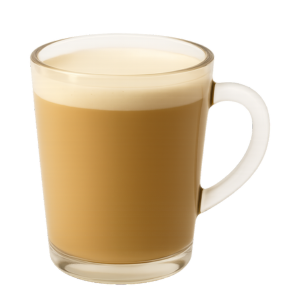
Café au Lait
Caffeine
90–120 mg
Note: Values are for a traditional French‑style café au lait made with equal parts strong brewed coffee and steamed whole milk. Using chicory coffee (New Orleans style) or different milk types will change the caffeine and calorie content.
| Attribute | Value |
|---|---|
| Caffeine Level | Moderate |
| Serving Size | 8 fl oz |
| Serving Size (ml) | 237 ml |
| Sugar | 5 g (naturally from milk) |
| Calories | 60–70 kcal |
| Caffeine per fl oz | 11–15 mg/fl oz |
Café au lait — French for “coffee with milk” — is a classic European coffee drink that blends strong brewed coffee with hot milk for a smooth, mellow flavor.
While it’s gentler on the palate than straight black coffee, it still contains a moderate amount of caffeine, making it a comforting yet energizing choice for mornings or leisurely afternoons.
What is Café au Lait?
Café au lait is traditionally served in wide‑rimmed bowls or large mugs, and its preparation varies slightly depending on the region. Here are the most common styles:
- French style – Equal parts strong drip‑brewed coffee and steamed milk.
- American café au lait – Often made with brewed coffee and hot milk, sometimes topped with foam.
- New Orleans style – Uses coffee blended with chicory, mixed with hot milk for a richer, slightly nutty flavor.
Each variation offers a different balance of strength and creaminess, but all share the same comforting coffee‑and‑milk foundation.
Caffeine Content in Café au Lait
The caffeine content depends on the coffee base, brewing method, and serving size. Here’s a general guide:
- French style (8 fl oz) – 90–120 mg caffeine (from strong drip coffee).
- American style (8 fl oz) – 90–120 mg caffeine (similar to French style).
- New Orleans style (8 fl oz) – 80–100 mg caffeine (slightly less due to chicory blend).
These numbers show that café au lait has less caffeine than a double espresso but can still deliver a noticeable boost — especially in larger servings.
Calories and Sugar
Café au lait’s calorie count comes mainly from the milk, with added sugar increasing the total. Here’s what to expect:
- Whole milk (8 fl oz) – 60–70 kcal, 5 g sugar (naturally from milk).
- 2% milk (8 fl oz) – 50 kcal, 5 g sugar.
- Non‑dairy milk – Varies widely; sweetened versions can add 30–60 kcal and 4–10 g sugar.
This means café au lait can be a light, low‑calorie drink if unsweetened, or a sweeter treat if flavored or topped with foam.
Ingredients Overview
Café au lait is built from just two main components, but their quality and ratio make all the difference:
- Coffee – Strong brewed coffee, often medium or dark roast, providing caffeine and aroma.
- Milk – Steamed or heated milk for creaminess and balance.
When combined in equal parts, these ingredients create a drink that’s both smooth and satisfying, offering the warmth of milk with the depth of coffee.
Nutritional Facts at a Glance (French Style, 8 fl oz)
Here’s the typical nutrition profile for a café au lait made with whole milk:
- Calories: 60–70 kcal
- Total Fat: 2–3 g
- Sodium: 40–50 mg
- Total Carbohydrates: 5 g
- Sugars: 5 g
- Protein: 3–4 g
- Caffeine: 90–120 mg (11–15 mg per fl oz)
These values confirm that café au lait is a moderate‑caffeine, moderate‑calorie beverage that can fit into most diets when enjoyed in reasonable portions.
